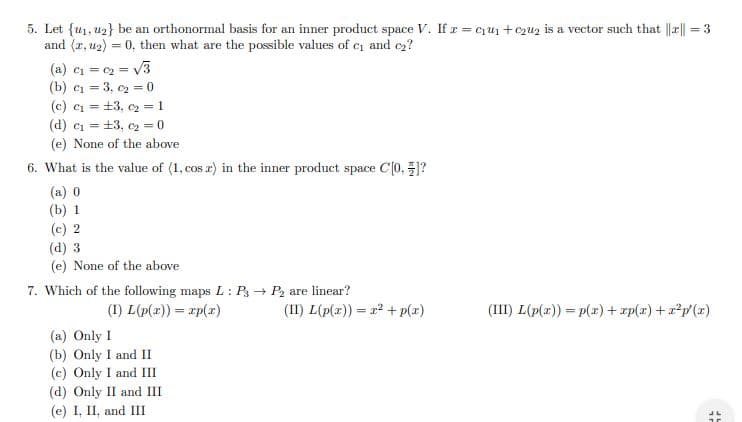5. Let {u1, u2} be an orthonormal basis for an inner product space V. If r = c u1 +czuz is a vector such that ||a|| = 3 and (r, u2) = 0, then what are the possible values of c and c2? (a) e1 = 2 = V3 (b) c = 3, c2 = 0 (c) c1 = +3, cz =1 (d) c1 = C +3, c2 =0 (e) None of the above 6. What is the value of (1, cos r) in the inner product space C[0, )? (a) 0 (b) 1 (c) 2 (d) 3 (e) None of the above 7. Which of the following maps L: P3 → P2 are linear? (I) L(p(x)) = xp(x) (II) L(p(x)) = r² + p(x) (III) L(p(z)) = p(r) + xp(x) + r?p'(x) (a) Only I (b) Only I and II (c) Only I and III (d) Only II and III (e) I, II, and III
5. Let {u1, u2} be an orthonormal basis for an inner product space V. If r = c u1 +czuz is a vector such that ||a|| = 3 and (r, u2) = 0, then what are the possible values of c and c2? (a) e1 = 2 = V3 (b) c = 3, c2 = 0 (c) c1 = +3, cz =1 (d) c1 = C +3, c2 =0 (e) None of the above 6. What is the value of (1, cos r) in the inner product space C[0, )? (a) 0 (b) 1 (c) 2 (d) 3 (e) None of the above 7. Which of the following maps L: P3 → P2 are linear? (I) L(p(x)) = xp(x) (II) L(p(x)) = r² + p(x) (III) L(p(z)) = p(r) + xp(x) + r?p'(x) (a) Only I (b) Only I and II (c) Only I and III (d) Only II and III (e) I, II, and III
Elementary Linear Algebra (MindTap Course List)
8th Edition
ISBN:9781305658004
Author:Ron Larson
Publisher:Ron Larson
Chapter5: Inner Product Spaces
Section5.3: Orthonormal Bases:gram-schmidt Process
Problem 17E: Complete Example 2 by verifying that {1,x,x2,x3} is an orthonormal basis for P3 with the inner...
Related questions
Question

Transcribed Image Text:5. Let {u1, u2} be an orthonormal basis for an inner product space V. If r = c u1 +czuz is a vector such that ||a|| = 3
and (r, u2) = 0, then what are the possible values of c and c2?
(a) e1 = 2 = V3
(b) c = 3, c2 = 0
(c) c1 = +3, cz =1
(d) c1 =
C +3, c2 =0
(e) None of the above
6. What is the value of (1, cos r) in the inner product space C[0, )?
(a) 0
(b) 1
(c) 2
(d) 3
(e) None of the above
7. Which of the following maps L: P3 → P2 are linear?
(I) L(p(x)) = xp(x)
(II) L(p(x)) = r² + p(x)
(III) L(p(z)) = p(r) + xp(x) + r?p'(x)
(a) Only I
(b) Only I and II
(c) Only I and III
(d) Only II and III
(e) I, II, and III
Expert Solution
This question has been solved!
Explore an expertly crafted, step-by-step solution for a thorough understanding of key concepts.
This is a popular solution!
Trending now
This is a popular solution!
Step by step
Solved in 3 steps with 3 images

Recommended textbooks for you

Elementary Linear Algebra (MindTap Course List)
Algebra
ISBN:
9781305658004
Author:
Ron Larson
Publisher:
Cengage Learning

Linear Algebra: A Modern Introduction
Algebra
ISBN:
9781285463247
Author:
David Poole
Publisher:
Cengage Learning

Elementary Linear Algebra (MindTap Course List)
Algebra
ISBN:
9781305658004
Author:
Ron Larson
Publisher:
Cengage Learning

Linear Algebra: A Modern Introduction
Algebra
ISBN:
9781285463247
Author:
David Poole
Publisher:
Cengage Learning